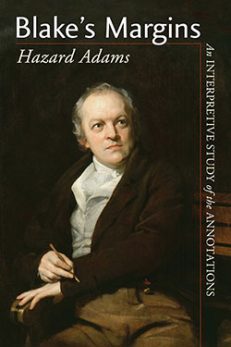Blake’s Margins
An Interpretive Study of the Annotations
$39.95
In stock
About the Book
Known for his prophetic and imaginative works of poetry, painting, and printmaking, William Blake was also a prolific reader and annotator of other writers’ works. This is the first work of criticism to consider Blake’s annotations in their entirety, and it covers such topics as art, poetry, theology, madness and philosophy, as well as the authors Lavater, Swedenborg, Bacon, Spurzheim, Berkeley, and Wordsworth, among others.
About the Author(s)
Bibliographic Details
Hazard Adams
Format: softcover (6 x 9)
Pages: 212
Bibliographic Info: notes, index
Copyright Date: 2009
pISBN: 978-0-7864-4536-3
eISBN: 978-0-7864-5547-8
Imprint: McFarland
Table of Contents
Preface 1
Introduction 3
1. Annotations to Johann Caspar Lavater’s Aphorisms on Man 7
2. Annotations to Emanuel Swedenborg’s Heaven and Hell, Divine Love and Divine Wisdom, and Divine Providence 28
3. Annotations to Bishop Richard Watson’s An Apology for the Bible 61
4. Annotations to Sir Francis Bacon’s Essays Moral, Economical, and Political 81
5. Annotations to Henry Boyd’s A Translation of the Inferno of Dante Alighieri 97
6. Annotations to Sir Joshua Reynolds’s Discourses on Art 109
7. Annotations to J. C. Spurzheim’s Observations on the Deranged Manifestations of the Mind, or Insanity 139
8. Annotations to Bishop George Berkeley’s Siris 150
9. Annotations to William Wordsworth’s Poems and Preface to The Excursion 160
10. Annotations to Robert John Thornton’s The Lord’s Prayer, Newly Translated 177
11. Addendum 193
12. A Note on Blake’s Reading 195
Index 199
Book Reviews & Awards
- “With the increasing appreciation of the nature of marginalia as a genre, Hazard Adams’s study of Blake’s is a timely one. Adams has the fine talents of discussing difficult passages lucidly without simplifying their meanings… all readers…will come away from it with a richer understanding of his thought”—Nbol.com
- “An important and interesting work…this is the first critical work to consider William Blake’s annotations in their entirety”—Oxford Journal






